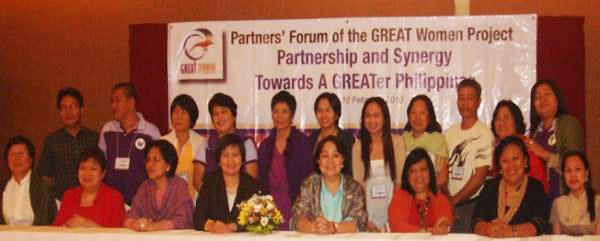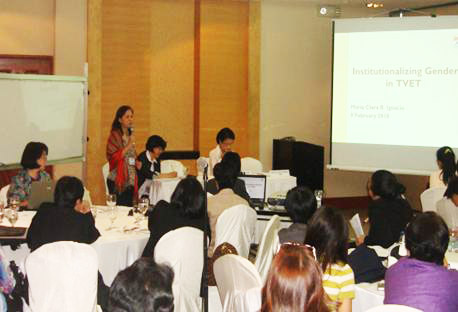GREAT Women Project present developments in creating an enabling environment for women’s economic empowerment

The two-day Partners’ Forum held parallel sessions for sharing of good practices. First-day parallel sessions centered on a sharing of good practices to create the national and local enabling environment for women’s economic empowerment, and facilitating safeguard strategies for environmental and social risks. Second-day parallel sessions focused on sharing of resource partners on their programs and services related to enterprise development.
In the session presentations for the First Day, speakers were Mario Nillos of Iloilo Province (Gender Mainstreaming in Programs and Projects of Iloilo Provincial Government), Blesshe Querijero of DOST (Pursuing Gender Responsive Science and Technology), Quezon Province representative Ofelia Palayan (Creating the Local Enabling Environment: The Quezon Province Experience), TESDA Center Chief Ma. Clara Ignacio (Institutionalizing Gender in TVET), Armida Marquez of Infanta, Quezon (When WEE See Through the Lens), Efren Logrono of Buenavista, Bohol (Integrating WEE in the AIP and Allocating Funds Therefor), Nimfa Lloren of Jagna, Bohol (Orchestrating Change: Managing Multi-Stakeholder Partnership in Advancing Gender and Development), MNDC representative Reuel Oliver (One-stop Women Enterprise Development Desk), Barugo representative Alden Avestruz and Pauline Lawsin-Nayra (Barugo and Runggiyan Social Development Foundation: Working Together for WEE), Joy Doronila Palmada and Baltazar Gumana of Pavia, Iloilo (LGU-Cooperative Partnership with the Pavia Eco-Savers’ Bank).

In the session presentations for the First Day, speakers were Marcelina Alcantara of DTI (Breaking Barriers: DTI), DOST Region V Director Tomas Brinas (DOST Small Enterprises Technology Upgrading Program), and Philhealth representative Gilda Salvacion Diaz (Integration and Promotion of WEE in the National Health Insurance Program), Ester Gamboa of Advocate for Philippine Fair Trade, Inc. (Made for Fair Trade Project), Feri Lumampao of Approtech Asia (Technology and Finance and the Entrepreneurial Poor), Ma. Rocelyn Bernabe of Philippine Business for Social Progress (Reducing Poverty Thru Enterprise Development), Jerry Pacturan of Philippine Development Assistance Program (Developing and Strengthening MSMEs’ Value-Chain and Industry Clusters for Poverty Reduction), Josephine Parilla of Pambansang Kalipunan ng Mga Manggagawang Impormal ng Pililpinas (Organizing, Advocacy and Enterprise Building: Issues of Informal Work, Social Protection, Poverty and Gender), Dr. Jaime Aristotle Alip of Center for Agriculture and Rural Development-Mutually Reinforcing Institutions (Microfinance: The CARD-MRI Experience), Lalaine Joyas (Microfinance Council of the Philippines), and Mercedes Abad of Ahon Sa Hirap (Promoting Social Protection of Women: ASHI Experience, 2008), and Emelina Santos of the National Confederation of Cooperatives (Microfinance Innovations in Cooperatives).
Occupational Safety and Health Center representative Ray Jose Soriano presented Occupational Safety and Health for Women Workers in Small Enterprises and Informal Economy. DTI Assistant Secretary Lourdes Baua presented an overview of the Harmonized DTI Project on Gender Responsive Enterprise Development with Focus on Food and Marine Sector. Through the partnership with the GREAT Women Project, the DTI conducted a value chain analysis of priority products, mainstreamed GAD in enterprise development programs and is customizing interventions for prioritized sectors.
The Partners’ Forum was capped by partner recommendations on improving synergy between LGU and NGA and NGO partners towards women’s economic empowerment and enabled the participants to have increased awareness and understanding of the wide range of programs and services of the NGAs and the role of the private sector for WEE sustainability. Participants also learned how various informal sectors in their localities can be organized for WEE and reactivate local economic development efforts.

